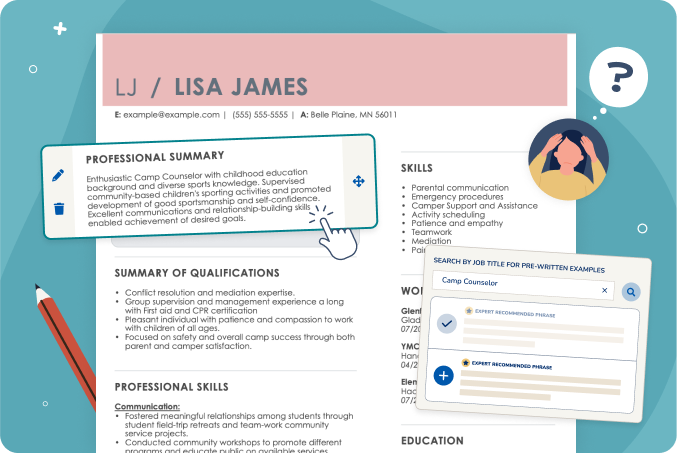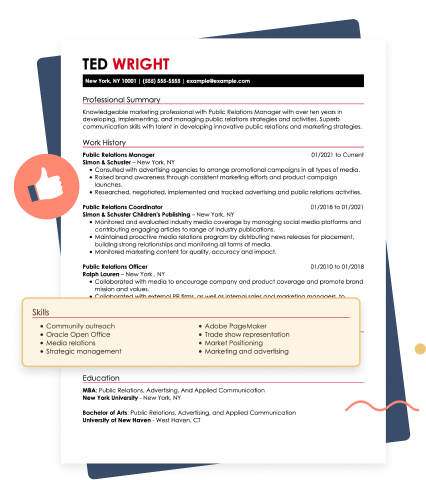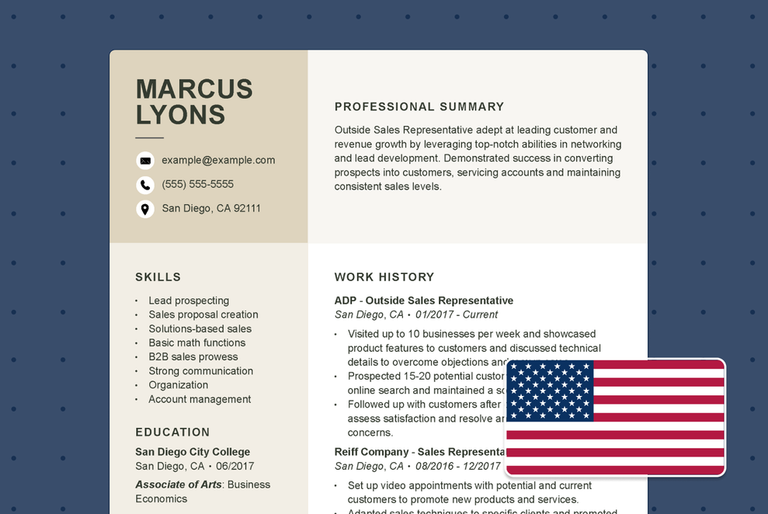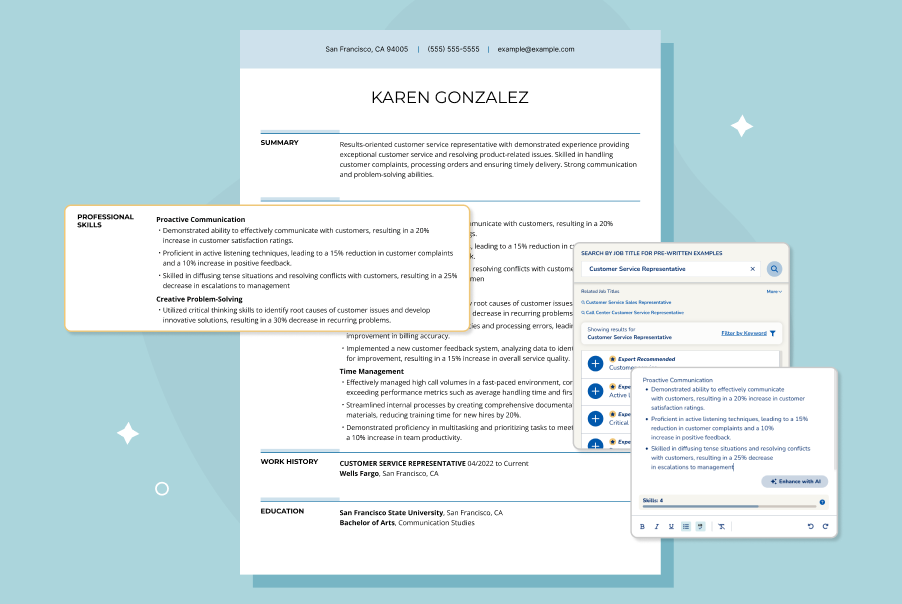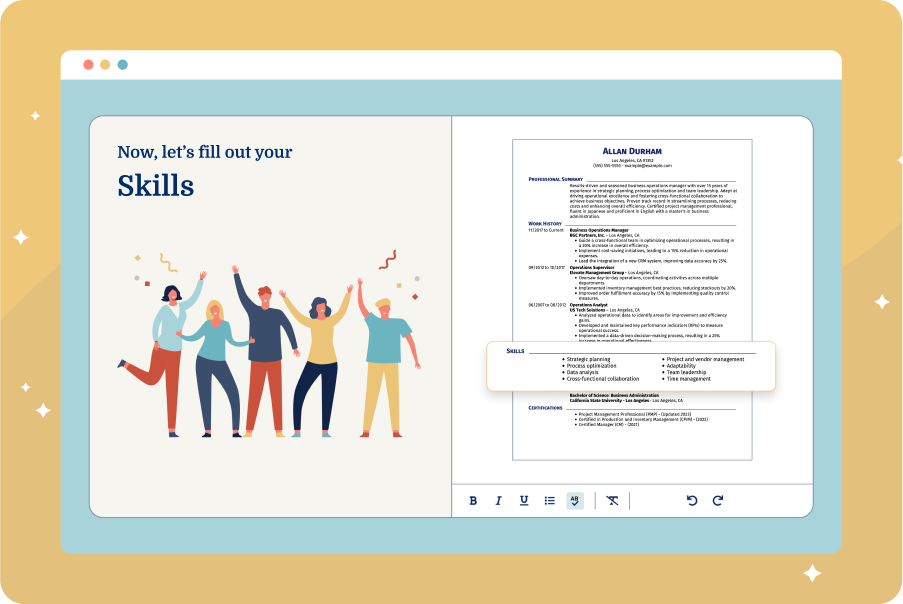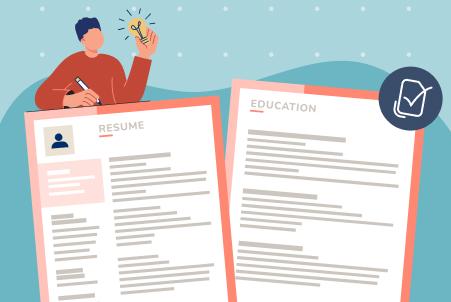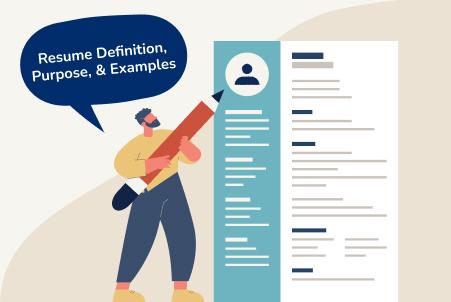How to Write a Resume: Guide & Examples

Our customers have been hired at: *Foot Note
Table of Contents
Get started with MyPerfectResume today!
- Build a resume on any device
- Pick an ATS-friendly template
- Tailor with AI copy suggestions
You need a resume, and you need it fast. But with only seconds to make a strong first impression on hiring managers, how can you ensure your resume stands out?
In this guide, we’ll cover everything you need to know about how to write a compelling resume, from essential sections to formatting tips for passing applicant tracking systems (ATS).
Get ready to increase your chances of landing the interview and securing your dream job.
Why a Professional Resume Matters
Your resume is an essential tool in the hiring process, providing potential employers with their first impression of you and allowing them to quickly assess your suitability for the job.
A compelling resume highlights your qualifications, experience, and skills, distinguishing you from other applicants and increasing your chances of securing an interview and landing the job.
Check out this video walkthrough of MyPerfectResume’s Resume Builder to see how you can speed up the process and create a resume right from your phone, tablet, or computer:
Video: How to Make a Resume in 3 Minutes With MyPerfectResume
How to Write a Resume for a Job
We’ll cover how to make a resume in a few simple steps. You can also use one of our professional resume templates to easily create a resume that aligns with employer expectations.
Step 1: Add your contact information
One of the most important steps in writing a resume is displaying your contact information so that hiring managers can reach out to schedule an interview.
Here’s what to include in your resume header:
- Your full name
- A reliable phone number
- Your professional email address
- Your city, state, and ZIP code
- A link to your professional profile, website, or portfolio
Explore our library of professional resume examples to see effective ways to display your contact information. Here is an example to help you get started:

Step 2: Write a resume summary or objective
A resume summary offers hiring managers a concise and impactful overview of your qualifications, skills, and experience related to the position.
Your resume summary should hook the reader and encourage them to continue reading. Avoid generic language and focus on the unique skills that set you apart.
Here is an example of how to write a resume summary:
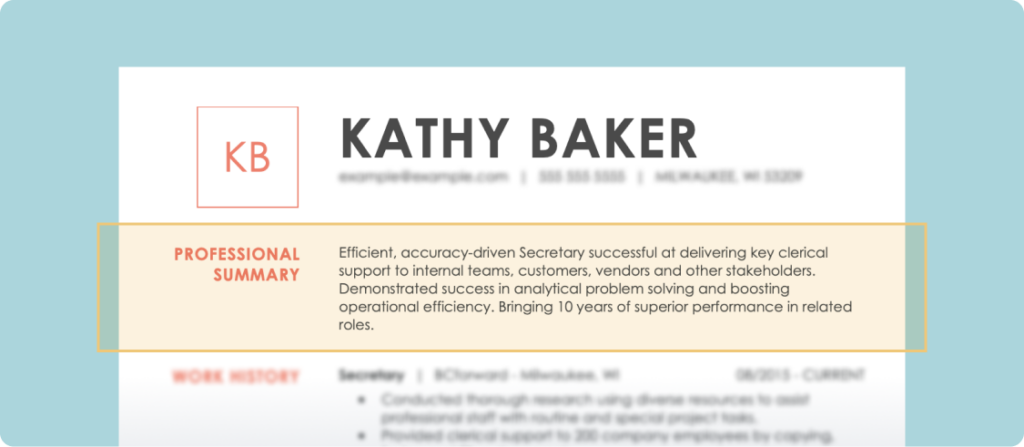
If you are a first-time job seeker, changing careers, or returning to work after a long absence, you can write a resume objective instead.
A resume objective focuses on your transferable skills and career goals that relate to the role and company. Here is an example of how to write an objective for a resume:

You can use our AI Resume Summary Generator to instantly get a professional summary tailored to your skills and experience.
Step 3: List job-relevant skills
Create a bulleted list of around 6 to 10 skills on your resume. Include a mix of hard and soft skills to show recruiters you are a well-rounded candidate.
Hard skills are specific, teachable abilities or knowledge you’ve gained through education, training, or experience (e.g., data analysis, cybersecurity, and programming).
Soft skills are personal qualities and interpersonal abilities that affect how you work and interact with others (e.g., communication, leadership, and teamwork).
Prioritize skills mentioned in the job description to create an ATS-friendly resume that passes automated screening tools hiring managers use to scan and organize resumes.
You can use your AI Resume Skills Generator to search for your current or target job title and generate a tailored list of industry-specific skills:
AI Resume Skills Generator

Step 4: Create your work history section
Employers want to know what they can gain by hiring you. They will look at your resume’s work history section to see how you have used your skills to make an impact in the workplace.
List your roles in reverse-chronological order, with the most recent position at the top. Include your title, the company name and location, and employment dates.
For each job, display three to five work accomplishments in bullet points and quantify them when possible. Start each bullet with an action verb (e.g., “developed,” “resolved,” and “administered”).
Including quantifiable achievements on your resume gives employers a tangible idea of how you’ve positively contributed to the organization or company in past roles. Here is an example:

Step 5: Add your education
Your resume’s education section should list your highest level of education first, including the degree earned, the school’s name, and its location (city and state). Here are a few tips:
- You can include your graduation year if it was within the last 5 to 10 years. If you haven’t graduated yet, then write the expected graduation date.
- Include the full name of your degree on your resume or the degree you expect to receive. For example, “Bachelor of Science in Nursing” or “Bachelor of Arts in English.”
- Only include high school if you’re a high school student, you didn’t attend university, or if it is requested in the job description.
Here’s an example of how to write a resume education section:
EDUCATION
Columbia University | New York, NY
Bachelor of Science in Social Work
Step 6: Include optional sections
Including optional sections—like certifications, volunteer work, languages, or awards—can help you stand out and showcase additional strengths. Explore optional sections and examples below.
Certifications and licenses
Some jobs, such as nursing, accounting, and teaching, require candidates to have certifications and licenses.
Create a separate certifications section below your education section to list certifications, licenses, or professional training relevant to the role.
Example of a current certification on a resume:
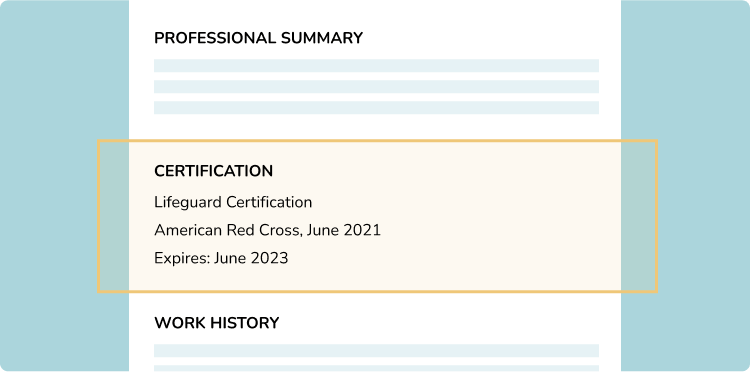
Example of an “in progress” certification on a resume:
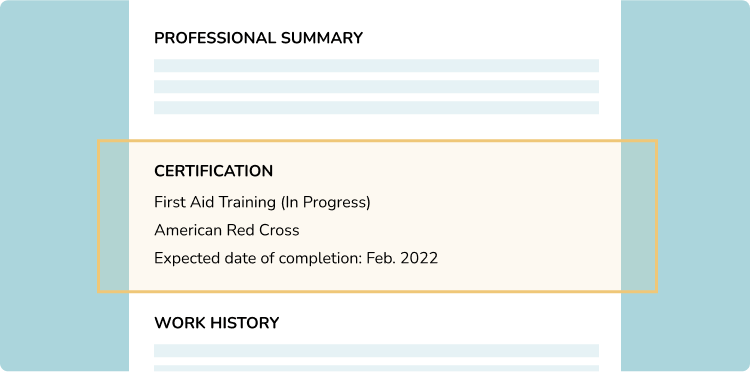
Example of a nursing license on a resume:
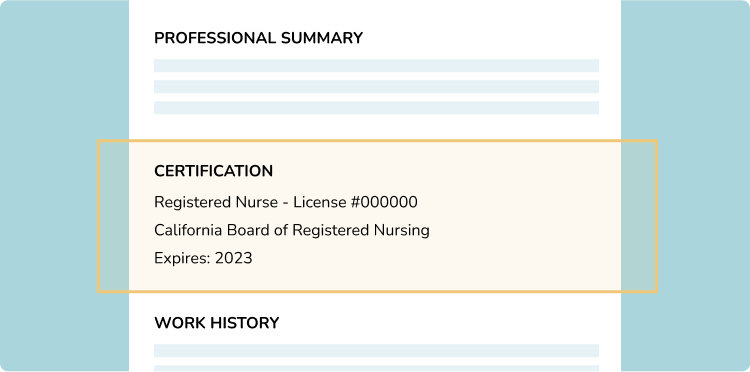
Volunteer experience
You can include volunteer experience on your resume if it’s relevant to the job, shows transferable skills, or helps fill employment gaps.
Format it like your work history section, highlighting your responsibilities and accomplishments. For example:
VOLUNTEER EXPERIENCE
Habitat for Humanity, Volunteer Builder, 2018–present
- Worked on construction projects to build and repair homes for low-income families.
- Collaborated with a team of volunteers and Habitat staff to complete projects on time and within budget.
American Red Cross, Volunteer Blood Donor Ambassador, 2017–2018
- Assisted with blood drives by welcoming donors, registering them, and providing information about the donation process.
- Helped to ensure a positive donor experience and encouraged repeat donations.
If you have minimal or no professional experience, consider adding relevant volunteer experience to your work history section. For clarity, include “volunteer” in the job title (e.g., “Volunteer Program Manager”).
Awards, honors, and publications
Include awards, honors, or publications on your resume if they’re relevant to the job or demonstrate exceptional achievement.
These sections are especially valuable in academic, creative, or research-focused fields.
If the award, honor, publication, or project is tied to your degree, you can include it as a bullet point in your education section below the university or high school name.
Example of an awards section on a resume:
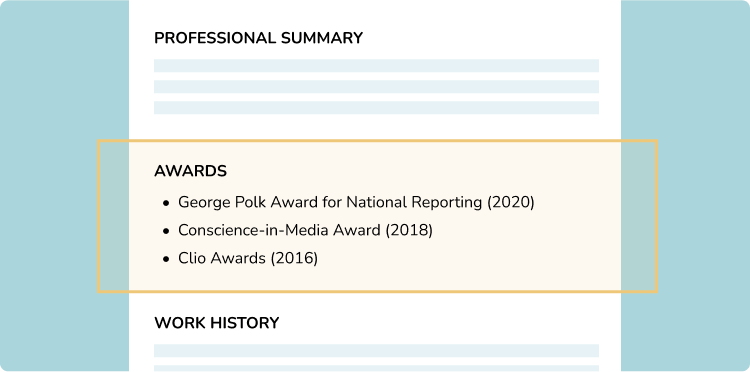
Example of an honors section on a resume:
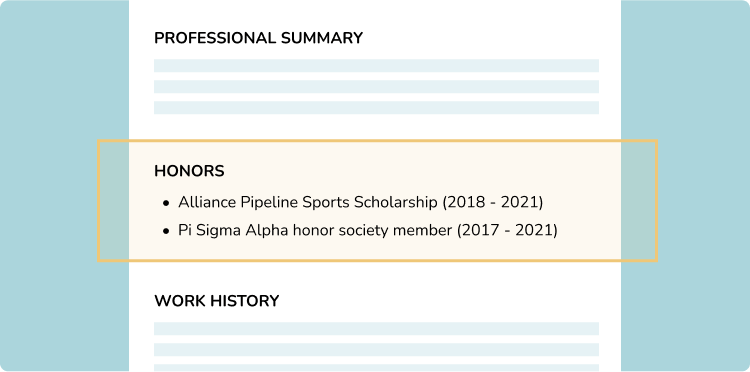
Example of a publications section on a resume:
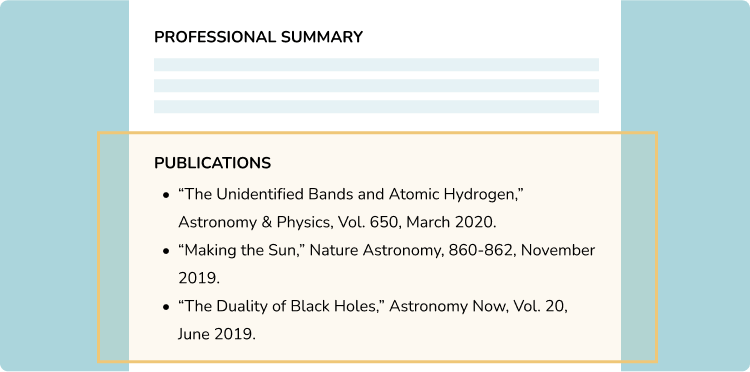
Choosing the Best Resume Format
Explore the three primary resume formats to learn how to prepare a resume that aligns with your experience level and effectively highlights your skills and qualifications.
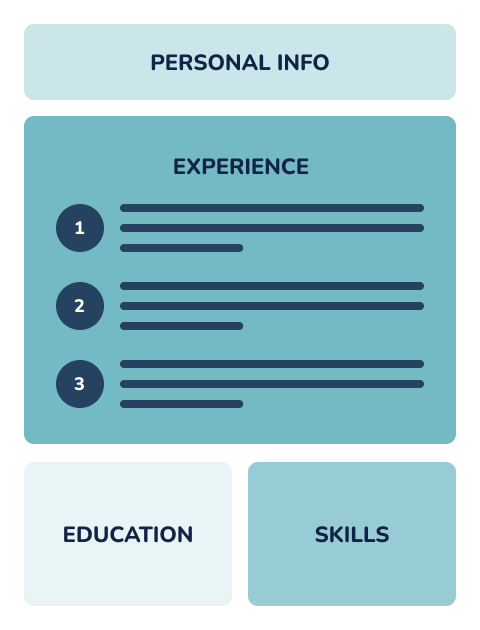
Chronological resume
The chronological resume format is the most commonly used and is preferred by most employers. This format places work experience front and center, making it ideal for candidates with a consistent work history and no employment gaps.

Functional resume
The functional resume format showcases your skills and training. It’s designed to highlight your marketable skills, even if your experience is limited. This format is excellent for those with employment gaps or limited professional experience.
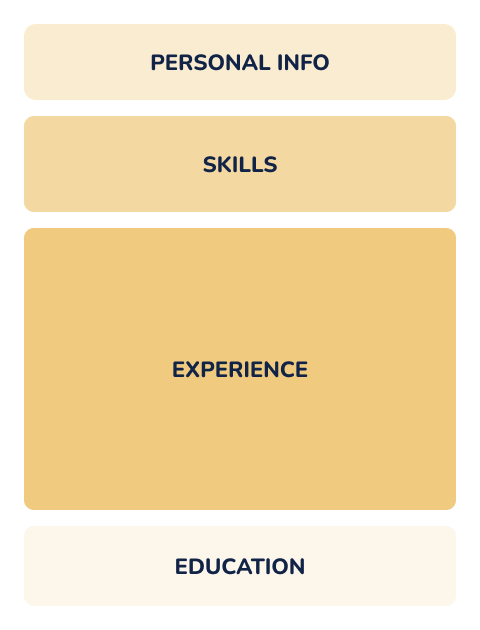
Combination resume
The combination resume format combines the best of the functional and chronological formats, allowing you to showcase your skills while highlighting your relevant work experience. It’s an excellent choice for job seekers who are changing careers or industries.
Tailoring Your Resume for Each Job
Tailoring your resume for each job application shows employers you’ve read the job description and understand what they’re looking for.
A customized resume makes a stronger, more targeted impression and increases your chances of landing an interview.
To start, identify skills or qualifications that are frequently repeated in the job description.
These are important resume keywords that can help you pass applicant tracking systems (ATS) and stand out to recruiters and hiring managers by demonstrating your fit for the role.
Tailoring your resume to fit the specific job you’re applying for is crucial and showcases your most relevant experiences and achievements while demonstrating you understand the employer’s needs.
– Jasmine Escalera, Career Professional
How to Make a Resume for Special Circumstances
Follow our resume tips to learn how to write a compelling resume for special circumstances, and ensure hiring managers know you have what it takes to do the job.
Limited work experience
Explore the tips below on how to write a resume with no experience while still demonstrating your relevant skills and knowledge:
- Use a functional resume format to focus on your relevant soft skills and technical skills, and place your work history further down the page.
- Write a resume objective highlighting your academic training and aligning your career goals with the company’s needs.
- Include certifications, relevant coursework, publications, or projects completed while listing your degree in the education section.
- In your work history section, include any volunteer or internship experience that can speak to your workplace abilities and achievements.
Changing careers
Follow these tips to write a career change resume that effectively showcases your ability to switch to a new industry:
- Choose a functional resume format to emphasize your transferable skills and how they can be applied to your new industry.
- In your resume objective, discuss your career change and how your current experience and strengths prepared you for this new challenge.
- Tailor your work history section to showcase achievements and workplace expertise that apply to your new industry.
- Highlight any certifications or online training demonstrating your commitment to learning new industry-specific skills.
Employment gaps
Here are a few tips for addressing an employment gap on your resume briefly and honestly, highlighting any productive activities you did during that time:
- Briefly explain your employment gap in your resume summary or objective and how you used that time to expand your industry knowledge or hone your skills.
- Create an additional “Core Competencies” or “Key Qualifications” section and list skills gained during your employment gap through volunteer work or personal projects.
- If your employment gap was substantial, treat it like a job. For example, if you took six years off to care for a relative, add it to your employment history section.
- Include any online workshops, certifications, or academic training you completed during your employment gap to show a commitment to skill development.
Searching for remote jobs? Our sister company, FlexJobs, updates listings daily. Find verified remote jobs—from remote transcription jobs to remote nursing jobs, and everything in between.
Resume-Writing Mistakes to Avoid
- Typos and grammatical errors: Spelling or grammar mistakes can make your resume look rushed or unprofessional. Always proofread carefully and consider having someone else review it before submitting.
- Poor formatting: Cluttered layouts, inconsistent fonts, and hard-to-read formatting can make it difficult for hiring managers to scan your resume. Stick to clean, simple formatting with professional resume fonts, clear section headings, and bullet points.
- Using a generic resume: Sending the same resume to every employer can hurt your chances. Each role is different—tailor your resume to highlight the skills and experiences that match the specific job description.
- Including irrelevant information: Personal details, outdated experience, or unrelated jobs can distract from your qualifications. Keep your content focused on what’s most relevant to the position you’re applying for.
- Making it too long: Recruiters spend seconds on an initial resume review. If your resume is too long or packed with unnecessary information, details may get overlooked. Aim for a one-page resume or a two-page resume, depending on your experience level.
- Listing duties instead of accomplishments: Don’t just describe your job responsibilities—highlight what you achieved. Use action verbs and include metrics when possible to show the impact of your work.
Proofreading and Finalizing Your Resume
Before sending out your resume, it’s essential to take the time to carefully proofread and polish it. Taking the extra time to finalize your resume with care shows professionalism and can give you a valuable edge in a competitive job market.
Start by reviewing your resume line by line, checking for grammar, punctuation, and consistency in formatting, such as font sizes, bullet point styles, and date alignment. Reading your resume out loud can help you catch awkward phrasing or repeated words.
MyPerfectResume’s Resume Builder has a helpful spell-checking tool that scans your document and flags any mistakes. It’s also helpful to step away for a few hours (or even a day) and come back with fresh eyes. Better yet, ask a trusted friend, colleague, or career coach to review it.
You can use our ATS Resume Checker to scan your resume for over 30 common errors and get instant suggestions to improve your resume score.
Beyond the Resume: Writing Your Cover Letter
A well-written cover letter reinforces your resume and helps you stand out to hiring managers. It allows you to introduce yourself, express your interest in the role, and explain why you’re a great fit. It is also an effective place to explain employment gaps and career changes.
Align your cover letter with your resume by highlighting the same key skills and experiences, but in a more personal, narrative format. Tailor it to the job by addressing the employer’s needs directly and showing how you can add value to their team.
Once you select the perfect template, you can use our Cover Letter Generator to make a compelling letter in a matter of minutes. You’ll get expert content suggestions tailored to your industry, role, and experience level.
Key Takeaways
- Your resume is your first impression on hiring managers—make it count by showcasing your qualifications clearly and professionally.
- Include all essential sections like contact info, a strong summary, relevant work history, skills, and education. Include optional sections if they are relevant to the position.
- Choose the right resume format based on your experience level and career goals to present your background in the best light.
- Tailor your resume for each job by using keywords from the job description and focusing on the most relevant accomplishments.
- Proofread carefully before submitting—small errors can cost you the interview, so double-check every detail and polish your final version.
- Pair your resume with a cover letter to introduce yourself, personalize your application, and show how you align with the role and company.
FAQ
What should a resume look like?
Your resume should be well-organized with clear sections, easy-to-read fonts, and a professional design that provides a snapshot of your skills, experience, and accomplishments.
It should have distinct sections such as contact information, a summary or objective, work experience, education, and relevant skills. Use a clean design with consistent formatting, including bullet points and spacing that make your resume easy to scan.
Avoid clutter or overly decorative elements that distract from the content. Explore what a standout resume looks like for more tips on formatting and layout.
Where can I make a resume for free?
You can use MyPerfectResume’s Resume Builder for free to make a resume with step-by-step prompts, expert insights, and professional content suggestions.
All you have to do is upload your resume or start a new one, answer a few questions, and within minutes, you’ll have a plain text resume that you can download for free.
How many jobs should you list on your resume?
When deciding which jobs to include, focus on positions that are most relevant to the role you’re applying for and that effectively showcase your skills, achievements, and experience.
As a general guideline, include the last 10 to 15 years of your work history or your 3 to 4 most recent positions, whichever provides the strongest representation of your qualifications.
If you have older experience that is highly relevant to the job, you can selectively include it even if it falls outside the 10- to 15-year window. Avoid listing every job you’ve ever held, as this can make your resume cluttered and harder to read.
Instead, aim for a concise, focused snapshot of your professional journey that emphasizes the roles and accomplishments most likely to impress a hiring manager.
How has AI impacted resume screening?
AI has significantly changed how resumes are reviewed and evaluated. Many employers now use AI-powered applicant tracking systems (ATS) to scan resumes for keywords, relevant experience, and specific skills before a human ever sees them.
This means that tailoring your resume to include industry-specific terminology and phrases can improve your chances of advancing past the initial screening.
To optimize your resume for AI screening, focus on clarity, proper formatting, and alignment with the job description. You can use MyPerfectResume’s AI Resume Builder to easily create a targeted, well-structured resume that stands out and gets results.
How do you write a resume on Google Docs?
Here’s how to write a resume for a job application in Google Docs:
- Go to the Google Docs website and log in with your Google account.
- Click on the “Template Gallery” button in the top right corner of the page. Select the “Resumes” category and browse through the available templates.
- Once you choose a template, click “Use Template” to open it in a new document. Edit the text to include your name, contact information, work experience, education, skills, and achievements.
- Once you finish editing your resume, save it by clicking “File” and then “Save.”
For a smoother experience, you can also use one of our Google Docs resume templates designed to help you create a professional, polished resume quickly.
Alternatively, you can build your resume from scratch using MyPerfectResume’s Resume Builder and then import it into Google Docs for easy editing and sharing.
How do you make a resume in Microsoft Word?
Here’s how to write a resume in Microsoft Word:
- Open Microsoft Word on your computer and select “New Document.”
- In the search bar, type “resume” and browse through the available templates. Select the template that best suits your needs.
- Once you choose a template, begin editing the text to include your name, contact information, work experience, education, skills, and achievements.
- Once you finish editing your resume, save it by clicking on “File” and then “Save.”
For expert content suggestions and resume writing advice, we recommend writing your resume in our Resume Builder.
Should I put my address on my resume?
Including your address on a resume is optional and depends on your comfort level and the relevance to the job you’re applying for. You do not need to provide your full mailing address.
If your location is important for the role—for example, if the employer is seeking local candidates—you may choose to include your city and state, and optionally your zip code.
If you prefer to keep your address private or if it isn’t relevant to the position, leaving it off is perfectly acceptable. You can always provide your full address later in the hiring process, such as during an interview or on official paperwork.
How long should my resume be?
The ideal length of a resume depends on your experience and the role you’re applying for. For most job seekers, one page is sufficient, especially if you have less than 10 years of experience. This ensures your resume is concise, focused, and easy for hiring managers to scan.
If you have extensive experience, multiple relevant roles, or significant accomplishments, a two-page resume is acceptable. Avoid exceeding two pages, as longer resumes can overwhelm recruiters and dilute your key qualifications.
Focus on quality over quantity and highlight the most relevant skills, achievements, and experiences that directly relate to the position you’re seeking, and remove outdated or less impactful information.
How We Reviewed This Article
Since 2012, we have helped more than 11 million job seekers. We want to make your career journey accessible and manageable through our services and Career Center’s how-to guides and tips. In our commitment to bring you a transparent process, we present our Editorial Process.
Our customers have been hired at:*Foot Note
